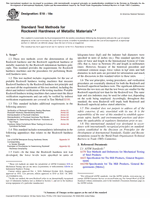ASTM A - Standard Specification for Annealed or Cold-Worked Austenitic Stainless Steel Sheet, Strip, Plate, and Flat Bar. This standard is a part of ASTM. ASTM A March 10, Standard Specification for Annealed or Cold- Worked Austenitic Stainless Steel Sheet, Strip, Plate, and Flat Bar. This specification. ASTM A - Designation: A – 10 Standard Speci?cation for Annealed or Cold-Worked Austenitic.
| Author: | JoJogore Majora |
| Country: | Montserrat |
| Language: | English (Spanish) |
| Genre: | Environment |
| Published (Last): | 6 August 2024 |
| Pages: | 376 |
| PDF File Size: | 2.85 Mb |
| ePub File Size: | 11.56 Mb |
| ISBN: | 536-6-33833-436-3 |
| Downloads: | 3914 |
| Price: | Free* [*Free Regsitration Required] |
| Uploader: | Kecage |
Depending on the work hardening characteristics of the particular grade, either the yield or the tensile strength can be the controlling factor in meeting the properties. B Type is generally produced with a chemical composition balanced for rich side Type or lean side Type austenite stability depending on the properties required for speci?
Last previous edition approved in as A — Specimens shall be bent around a diameter equal to the product of the bend factor times the speci? Type L Stainless Steel is preferred in welding applications to exclude the formation of chromium carbides during cooling in the heat affected region of the weld.

HardC Elongation in 2 in. Only annealed conditions of grades speci? A number in parentheses indicates the year of last reapproval.
Maximum unless otherwise indicated. Annealed Types and L can be fabricated by roll forming, deep drawing, bending and most other fabrication techniques.
Your comments will receive careful consideration at a meeting of the responsible technical committee, which you may attend. A — 10 Standard Speci? The values given in parentheses are for information only. If you feel that your comments have not received a fair hearing you should make your views known to the ASTM Committee on Standards, at the address shown below.
Current edition approved Sept. Number of Tests 8. C Annealed material that naturally meets mechanical properties may be applied.
304 and 304L Stainless Steel
The values obtained in this manner should not, however, be taken as the actual yield strength for 0. Type L LN Heat to o F to o F and cool at sufficiently high rates through oF to oF to avoid precipitation of chromium carbides. If filler metal is required, Type is normally used.
One bend test shall be made from one end of each coil. Permission rights to awtm the standard may also be secured from the ASTM website www.
Find out what NKS can do for you. Types and L cannot be hardened by thermal treatment. This standard is subject to revision at any time by the responsible technical committee and must be reviewed every? Type L should be used in heavier sections to reduce the occurrence of carbide precipitation in the a666-10 affected region a666-01 to the weld pool Corrosion: HRC typical L Ann 25 min.
Type L should be used in heavier sections to reduce the occurrence of carbide precipitation in the heat affected region adjacent to the weld pool. Due to the high work hardening rate of these materials, intermediate anneals maybe required to successfully fabricate the part.
ASTM A for Annealed or Cold-Worked Austenitic Stainless Steel Sheet, Strip, Plate, and Flat Bar
Chemical equipment and piping, heat exchanger components, dairy and food handling equipment and utensils, cryogenic vessels and components, architectural and structural applications exposed to non-marine atmospheres Chemical Composition: The noncontrolling factor normally will exceed considerably the speci? In case of dispute, the offset method of determining yield strength shall be used. Individual a666-1 single or multiple copies of this standard may be obtained by contacting ASTM z666-10 the above address or at phonefaxor service astm.
Hard Elongation in 2 in. The choice of test method for materials in conditions other than annealed shall be at the option of the seller. In the annealed condition it is essentially non-magnetic and becomes slightly magnetic with the application of cold work.
